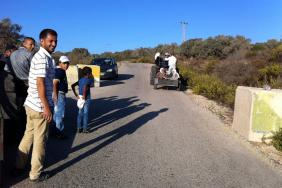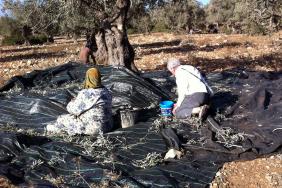'Anin, Barta'a-Reihan, Tura-Shaked
Photos: Farmers from Anin go out to harvest in the Seam Zone. This year, too, a limited number of permits were issued for this important season




abobe: Lea helps to gather the olives
6:15– Barta’a-Reihan Checkpoint
Many people and cars wait in the upper parking lot (the Seam Zone). We go down by car to the lower Palestinian parking lot and park by the opening of the entrance. Crowds mill around beside the only carousel to the terminal. The short sleeve that was recently installed there is closed from the top in order to prevent the young people from jumping over the heads of those waiting in the hours of difficult crowding, like now. The crowding inflames the nervousness and anger. Next to the second carousel nearby that is designated for transferring people from the Seam Zone to the West Bank, there are few women waiting. We wave past the inspection post and they open the carousel for them (even for one woman) and change the direction to cross the terminal. Everyone understands that the women, in no way, would dare to crowd together with the men in the line nearby. After a break that appears to be long, the carousel is opened and those waiting are pushed forward with force. They told us that about 60 workers entered in one round of the carousel. A worker of about 50 years, returns from his night shift as guard at one of the factories in the industrial area of Shahak, next to the settlement of Shaked. He is very satisfied with his working conditions and is proud of it. We hurry to the next two checkpoints that open at 7:00, but although we parked close to the exit, our car is blocked. Only after the dozing driver agrees to move his truck, were we successful in maneuvering out.
that was recently installed there is closed from the top in order to prevent the young people from jumping over the heads of those waiting in the hours of difficult crowding, like now. The crowding inflames the nervousness and anger. Next to the second carousel nearby that is designated for transferring people from the Seam Zone to the West Bank, there are few women waiting. We wave past the inspection post and they open the carousel for them (even for one woman) and change the direction to cross the terminal. Everyone understands that the women, in no way, would dare to crowd together with the men in the line nearby. After a break that appears to be long, the carousel is opened and those waiting are pushed forward with force. They told us that about 60 workers entered in one round of the carousel. A worker of about 50 years, returns from his night shift as guard at one of the factories in the industrial area of Shahak, next to the settlement of Shaked. He is very satisfied with his working conditions and is proud of it. We hurry to the next two checkpoints that open at 7:00, but although we parked close to the exit, our car is blocked. Only after the dozing driver agrees to move his truck, were we successful in maneuvering out.
7:05 – Tura-Shaked Checkpoint
Seven o’clock is the opening hour but the soldiers are still marching to cross the checkpoint that obviously opens late. The traffic is conducted very slowly at the checkpoint. We didn’t see students because the schools are striking today as a token of mourning the death of many Palestinians in recent days. A young worker who returns from a night shift refuses to accept candy and claims that he upholds the commandment to fast on Mondays and Thursdays.
7:35 – Anin Checkpoint
At the intersection, about 200 meters before the checkpoint, we met many farmers who already passed through and are hurrying to their olive groves. We heard complaints that few of their family members received permits this special season, which the farmers wait for all year; that according to tradition, every member of the family, from babies to old people, participate in the work (of harvesting olives). We gave to those who were interested, relevant telephone numbers. An additional complaint concerned the non-opening of the checkpoints on Shabbatot, despite the fact that they received a notice that in the weeks of harvesting the olives, the farmers’ checkpoints would be open every day. Leah spoke with G., a new, polite officer at Matak, who promised to clarify the issue by the next week.
The people are checked next to the middle gate at the checkpoint, that is closer to the village, and it is possible to discern from afar, the tumult of many who were waiting. A representative of Matak parks close to the place and at a given time, conducts his own inspections. Tractors filled especially with women and children, are strictly checked. Names of the children, those who are too young to receive identity cards, are checked with identity cards of the parent who goes out to harvest. They explain to us that the children are on vacation because today is the Moslem New Year. At 8:05 the last tractor passes through and the three checkpoint gates are locked. We enjoyed ourselves a bit with the (olive) pickers and their children in a grove next to the checkpoint. Afterward, we picked up a worker who was ill from a serious work-related wound and brought him to his destination.
are locked. We enjoyed ourselves a bit with the (olive) pickers and their children in a grove next to the checkpoint. Afterward, we picked up a worker who was ill from a serious work-related wound and brought him to his destination.
